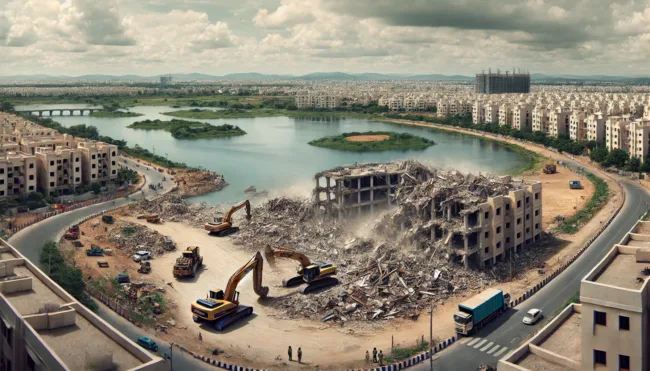Telangana’s HYDRA crackdown: Government demolishes illegal properties—who’s next?
The Hyderabad Disaster Response and Assets Monitoring Protection Agency (HYDRA) has intensified its demolition campaign, targeting illegal structures across Hyderabad. This initiative, directed by the Telangana government, focuses on clearing encroachments around vital water bodies such as Appa Cheruvu, Durgam Cheruvu, and Mamidi Cheruvu, as well as the high-profile N Convention Centre. The demolitions, intended to reclaim public land and prevent future flooding, have ignited political controversies, legal battles, and public debate.
Government Targets Encroachments Around Major Lakes
The demolition drive began with a strong emphasis on removing unauthorized constructions around critical water bodies, such as Appa Cheruvu and Mamidi Cheruvu in Gaganpahad. HYDRA, working with revenue and irrigation departments, demolished several industrial sheds and other unauthorized structures. These demolitions were aimed at restoring the Full Tank Level (FTL) areas of the lakes, which have been severely encroached upon over the years. Officials noted that Appa Cheruvu’s water spread area, which originally covered 34 acres, had shrunk to around 12 acres due to illegal constructions.

The demolitions have led to political uproar, especially after the property of Thokala Srinivas Reddy, a Bharatiya Janata Party Corporator, was flattened in the Gaganpahad area. While Reddy and his supporters have accused the government of using HYDRA for political vendettas, the Telangana government maintains that the demolitions are strictly to enforce urban development and environmental protection regulations.
Durgam Cheruvu Demolitions and the Impact on Local Businesses
Durgam Cheruvu, another significant lake in Hyderabad, has also been a focal point of HYDRA’s demolition efforts. The agency targeted several commercial establishments and unauthorized settlements around the lake, which is both an ecological hub and a tourist attraction. HYDRA officials cited the need to preserve the lake’s natural catchment area and prevent illegal constructions from aggravating urban flooding problems. However, business owners and residents have expressed their frustration, claiming they were not given sufficient notice or legal recourse before the demolitions were carried out. The Telangana High Court, in response to multiple petitions, has directed HYDRA to follow proper legal procedures in future operations.
N Convention Centre: A High-Profile Case in the Demolition Campaign
The demolition of parts of the N Convention Centre, a luxury venue associated with popular actor Akkineni Nagarjuna, has been one of the most contentious actions taken by HYDRA. The centre, which partially encroached on the FTL zone of Durgam Cheruvu, was deemed an unauthorized construction and demolished without prior notice, according to Nagarjuna. He criticized the authorities for not following due process, stirring public sentiment and bringing further attention to the government’s demolition policies.
Legal Battles and Political Reactions
The demolition drive has led to several legal challenges. The Telangana High Court has intervened to ensure that HYDRA and associated government agencies adhere to legal protocols. For instance, the court recently halted demolitions on properties owned by Palla Rajeshwar Reddy, a leader of the Bharat Rashtra Samithi (BRS), until proper notices are served and legal procedures are observed. Justice T Vinod Kumar stated that HYDRA must follow due process to prevent unwarranted demolitions and ensure fairness in its operations.
In a parallel development, Chief Minister A Revanth Reddy has acknowledged complaints about some officials using HYDRA’s authority to extort money from property owners under the guise of demolition notices. He warned that strict action would be taken against any such corrupt practices and instructed vigilance agencies to keep a close watch on the demolition operations.
Impact of the Demolition Drive
Urban development experts have lauded the Telangana government’s intention to reclaim public land and restore Hyderabad’s natural water bodies. Still, they stress the need for a transparent and legally sound approach. According to Ravi Reddy, an environmental activist, while the demolitions are necessary to prevent disasters like the 2020 Hyderabad floods, “the government must ensure that the process is fair and that no individual or political entity is unfairly targeted.” This sentiment reflects a broader concern that HYDRA’s actions should not become a tool for political vendettas but remain focused on sustainable urban development.
The Road Ahead for HYDRA and the Telangana Government
As HYDRA continues its demolition drive, the agency faces the challenge of balancing urban renewal with legal fairness and political neutrality. The Telangana government’s commitment to reclaiming encroached land and preventing urban flooding is commendable. However, the success of these initiatives will depend on maintaining transparency, adhering to legal protocols, and avoiding selective targeting.
With more demolitions expected, including further action in Ramnagar and other key areas, the spotlight remains on HYDRA and its ability to navigate the complex interplay of urban planning, environmental conservation, and political interests. How the agency proceeds will set a critical precedent for urban management in Hyderabad and potentially across India.
Discover more from Business-News-Today.com
Subscribe to get the latest posts sent to your email.

